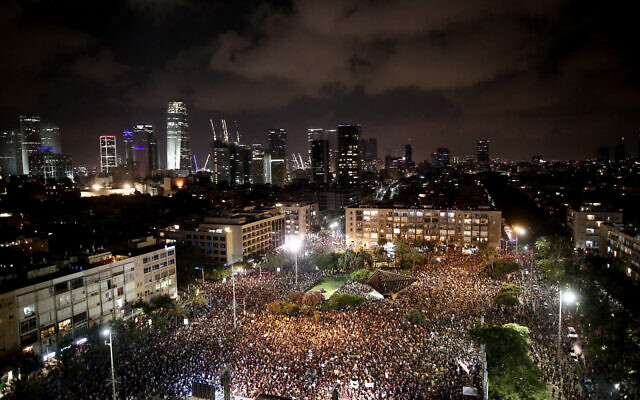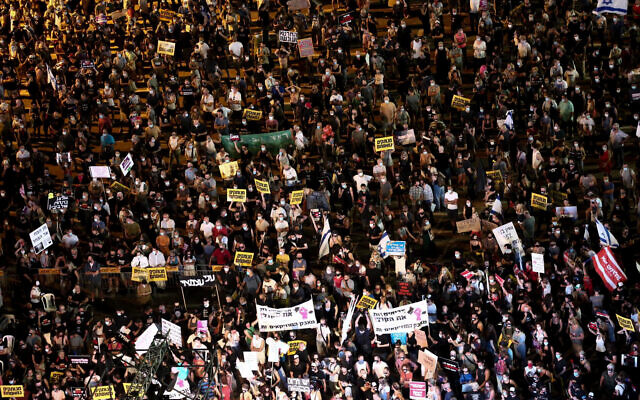Demonstrators decry insufficient financial support to small business owners and independents, amid ongoing coronavirus crisis; scuffles, arrests reported as crowd disperses
Thousands
of people descended on Rabin Square in Tel Aviv on Saturday evening to
protest against the Israeli government’s handling of the economic crisis
caused by the ongoing coronavirus pandemic, and what they say is
insufficient aid offered to small business owners and professionals in
the hard-hit entertainment and hospitality industries.
Organizers
said some 10,000 people were at the noisy but peaceful demonstration
Saturday evening. Police initially said it would restrict the number of
participants but ended up widening the area to allow for a bigger crowd.
As
the protest dispersed later Saturday, scuffles were reported near
Azrieli junction between police and demonstrators who attempted to block
traffic. Some three to five people were reported arrested during the
confrontations.
While
the organizers said the demonstration would be non-partisan, with no
party politicians addressing the rally, a number of posters calling
Prime Minister Benjamin Netanyahu a corrupt leader were spotted in the
crowd. Earlier in the evening, protesters wearing shirts emblazoned with
the words “crime minister,” were asked by organizers to leave,
according to the Kan public broadcaster.
Addressing
the crowd at the protest, Ahinoam Nehmad, the owner of a domestic
tourism company, said: “The fight began with the lockdown and continued
with not receiving fair compensation. We fight for the present, for our
livelihood, for our dignity as human beings — and that is no
‘bullshit,'” said Nehmad in what appeared to be a dig at Likud Minister
without Portfolio Tzachi Hanegbi, who last week dismissed as “bullshit” claims that some Israelis don’t have enough money for food amid the economic crisis. Hanegbi later apologized for the comments.
Tel
Aviv resident Ruti Arenfeld told the Times of Israel she was attending
the protest to show solidarity with many of her friends who have lost
their jobs as a result of the government’s crippling restrictions aimed
at curbing the spread of the virus.
“I’m
not here to make a political statement. There are some who are trying
to make this about Bibi’s corruption, but I think that’s a mistake,” she
said as a man walked by her with a poster reading “corrupt ones go
home,” next to a picture of Netanyahu.
“I’m
here to call on the government to do what it has promised. To transfer
the money to the wage workers and small businesses,” continued Arenfeld.
“You told them to close and they did that. Now it’s your turn to help
them before it’s too late.”
Ahead
of the protest, hundreds of police deployed to the area, calling on
protesters to adhere to social distancing rules and wear masks.

Israelis
attend a protest in Tel Aviv’s Rabin Square against the government’s
economic policies during the coronavirus pandemic, on July 11, 2020.
(Jacob Magid/Times of Israel)
Large
numbers of police officers were deployed in and around Rabin Square,
with some of them playing a pre-recorded message reminding protesters to
abide by the guidelines.
In
an interview with Channel 13 news Saturday evening, Finance Minister
Israel Katz asserted that “the demonstrators don’t have a reason to
protest,” adding that “we haven’t lost control over what’s happening in
the economy.”

nance Minister Israel Katz on June 17, 2020 (Kan news screenshot)
He
promised that the latest government stipend for independents and small
businesses “will reach the bank on Tuesday and you’ll see this in your
account on Wednesday.”
At the rally, Ra’anana resident Tali Agnes told the Times of Israel that “this is not another Tel Aviv protest.”
“I
have never been to one of those protests against Netanyahu. I’m not
even sure he needs to ‘go home,’ but his government has neglected so
many Israelis and expected us to remain silent,” she explained. “My
brother has been furloughed twice, my cousin is a social worker fighting
for the right to make more than NIS 1,500 ($430) a month. They can’t go
on like this.”
Agnes,
54, acknowledged that the pandemic places the government in “an almost
impossible situation,” but she argued that there was no long-term plan
formulated when things got better.
“They
worry about annexation, tax benefits, and who knows what. Everything
but us,” Agnes said in reference to the recent annexation plans for some
West Bank lands advanced by Netanyahu and the recent approval for retroactive tax benefits worth hundreds of thousands of shekels for Netanyahu himself.

Israelis
from various industries call for financial support from the Israeli
government amid the ongoing coronavirus crisis, at a protest in Tel Aviv
on July 11, 2020. (Miriam Alster/Flash90)
Some protesters did take direct issue with the prime minister’s leadership and his coalition government.
Ramat
Gan resident Ron Amar said he decided to attend the protest to call for
the current government’s replacement. “The only way to fix the economy
is to remove the people in power,” he asserted.
Yarin
Katz, a recent high school graduate, told the Times of Israel that he
was not used to attending such protests, but decided to participate
because he is worried about his future.
“I
was hoping to use this time to travel or hang out with friends, but
I’ve started working [as a] Wolt [food delivery man] to help the family
after my dad’s event venue was forced to shut down,” Katz said.
“My dad works so hard. Harder than anyone I know. If he can’t make it through this, how will I be able to?” he asked.
Unemployment
in Israel is at some 21 percent — or 850,000 people — and is rising, as
restrictions imposed amid record daily coronavirus infections further
batter the economy. Unemployment at the height of the pandemic reached
over 25 percent, with over a million Israelis out of work.

Israelis
protest in Tel Aviv’s Rabin Square against the government’s economic
policies during the coronavirus pandemic, July 11, 2020. (Jack Guez/AFP)
People
of varied economic backgrounds and sectors were at the demonstration on
Saturday, including owners of hard-hit small businesses, freelancers
and independent workers, members of the entertainment industry and of
the restaurant and hospitality sector, as well as university students.
Student unions said they would take part in the event to show their
concern at the large numbers of young people made jobless by closures.
Israel
imposed a broad lockdown starting in mid-March, allowing only staff
deemed essential to go to work and banning public assembly. Places of
entertainment were closed, hitting the leisure industry hard.
Facing
public and economic pressure, the government eased restrictions in late
May. Some restrictions have been gradually reimposed this month, as the
number of new COVID-19 cases has reached new highs of over 1,000 a day.
Israel’s virus death toll was 354 as of Saturday.
While
salaried workers sent on furlough received unemployment benefits, the
self-employed said that most had been waiting months for promised
government aid to reach them.
“There
is a very grave crisis of confidence between us and the government,”
Shai Berman, one of the protest organizers, told Israeli public radio
earlier Saturday.
“We
are part of a very large [group of people] which is feeling growing
distress and wants to demonstrate, and simply does not believe the
[government’s] promises,” he added.

Thousands
of Israelis protest at Rabin Square in Tel Aviv, calling for financial
support from the Israeli government amid the coronavirus crisis, on July
11, 2020. (Miriam Alster/Flash90)
As
Israel contends with the alarming surge in coronavirus cases in recent
weeks, Netanyahu has faced a tide of criticism over the government’s
handling of the economic fallout of the pandemic, with polls indicating growing disapproval of his stewardship of the economy.
There has been widespread anger from various sectors of the economy whose
members say the government is not doing enough to help them weather the
crisis, accompanied by outrage over the alleged misdirection of
financial aid and the bureaucratic complexities of obtaining assistance.
On
Friday, representatives for self-employed Israelis and small business
owners hurt by the pandemic met with Netanyahu to discuss their
grievances. Netanyahu’s office described the three-hour meeting as
“positive,” while a lawyer with the business owners called it “charged.”

Prime
Minister Benjamin Netanyahu (center) and Finance Minister Israel Katz
(right) meet with representatives of self-employed Israelis and small
business owners at the Prime Minister’s Office in Jerusalem, on July 10,
2020 (PMO)
Netanyahu told the representatives the government would keep its promises on immediate financial aid packages for independents and small businesses.
Meanwhile,
Finance Minister Israel Katz said businesses’ pain and concern were
understandable and promised to swiftly move forward with legislation to
allow economic support to be deployed.
Attorney
Roee Cohen, president of Lahav, the Israel Chamber of Independent
Organizations and Businesses, told the Ynet news site that the Friday
meeting was “charged” and that he and other representatives had raised
many issues with the economic support plans — those set to be
implemented and those provided thus far.
Netanyahu
said Thursday that the government had ordered the acceleration of
previous payouts, which many have said hadn’t arrived.
The
premier said a new stipend for self-employed Israelis would be paid out
immediately, as early as next week, “without any conditions or
bureaucracy, even without Knesset legislation.” He said there had been
significant bureaucratic difficulties in approving those payments.
Other
parts of the aid package included a “safety net” for salaried employees
and for businesses, as well as expanding the eligibility for
unemployment benefits.
Small
businesses will receive up to NIS 6,000 once every two months, he
announced. Big businesses will receive aid totaling up to NIS 500,000,
depending on how much the business was harmed due to the crisis.
The
last few weeks have seen the reversal of many of the gains made in the
fight against the coronavirus in recent months. New daily virus cases,
which had dropped to low double digits through most of May, have soared,
with a daily record of over 1,600 on Thursday, and the number of active
cases reached an all-time high of 18,296 on Saturday night.
The
current increase in weekly infections in Israel is one of the highest
in the world, according to a chart published Monday afternoon by the
Health Ministry.
The
government this week passed a raft of new restrictions to limit the
spread of the virus. The restrictions limited the number of people
allowed in restaurants and synagogues, reduced the number of passengers
permitted on public transportation, hiked fines for not wearing face
masks, and shut down event halls, cultural venues, swimming pools, gyms,
bars and nightclubs.
AFP contributed to this report.

Keine Kommentare:
Kommentar veröffentlichen